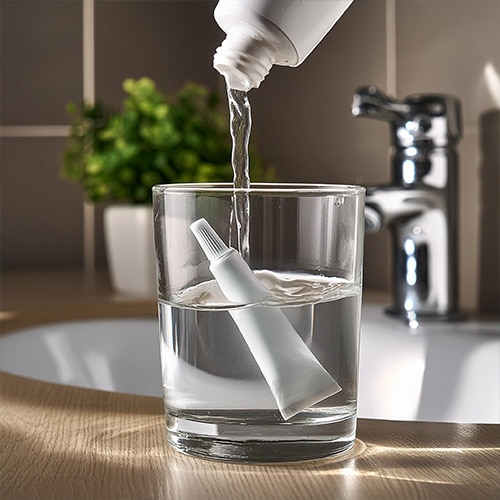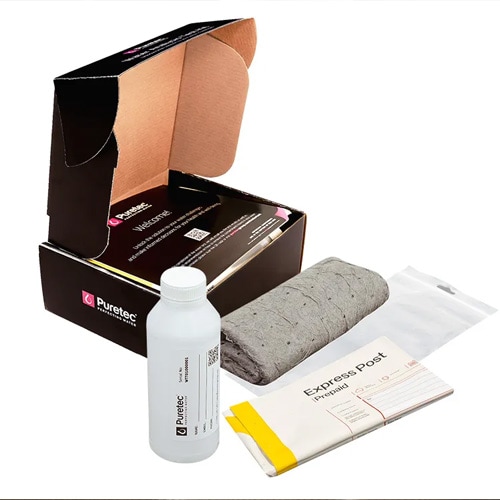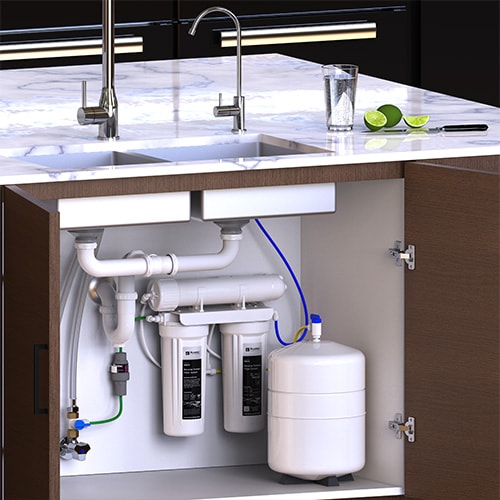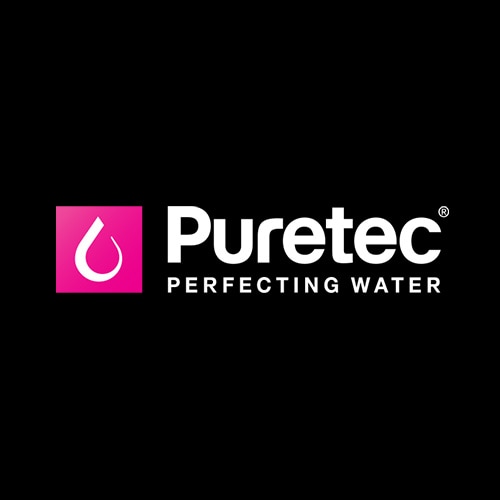Is your tap water friend or foe? Are you worried about hidden nasties lurking in every sip? The addition of fluoride to water supplies is a topic of considerable debate, with diverse opinions and scientific perspectives shaping the discussion. Reverse osmosis (RO) filter system, which filter out fluoride, are taking the water filtration world by storm.
Read on to unpack the truth about fluoride, explore the science behind reverse osmosis filtration, and know the important facts to help you decide if a reverse osmosis filter is the right fit for your home.
What is Fluoride?
Fluoride is a naturally occurring mineral found in rocks, soil, plants, water, and even foods and beverages. We also know by now that Fluoride is commonly added to toothpaste to improve dental health.
Back in the 1950's, the natural levels of fluoride in our water was increased by Australian water suppliers in an attempt to improve the nation's teeth, a practice known as water fluoridation. Not all water was affected by this, as some parts of Australia naturally had sufficient fluoride levels in their water to benefit dental health, and additional fluoridation was not seen as required.
Since then, theNational Health and Medical Research Council (NHMRC)has shown that drinking fluoridated water overall can reduce tooth decay by 26-44% in Australian children, teenagers, and adults.
With this in mind, your teeth can benefit from fluoride in the following ways:
- •Reduced tooth decay and fewer cavities
- •Strengthened tooth enamel
- •Decreased dental treatment costs
- •Prevention of harmful oral bacteria growth
- •Less need for fillings and extractions

What's the fear around Fluoride?
Opponents of water fluoridation still raise concerns about its other potential health risks. Some of the claims suggest that the risks of adding fluoride to the water supply outweighs any potential benefits. Since this time in the 1950s, conspiracy theorists have made persistent claims that fluoridation was a communist plot to "dumb down" citizens.

More critics claim that fluoride is used as a 'means of mind control', while others suggest it 'supports the sugar industry by allowing people to consume more sweets without getting cavities'.
Moving internationally, the topic of fluoride swirls on social media groups such as the 'New York State Coalition Opposed to Fluoridation', which has attributed Fluoride to various health issues including thyroid damage. The conversation continues on platforms like Reddit and Twitter, with fluoride frequently accused of 'killing gut bacteria and being a cancer-causing neurotoxin'.
Additional arguments raise that adding fluoride to public water supplies is a form of 'mass medication without individual consent'. Others propose that water fluoridation benefits are primarily topical, and that the same benefits can be achieved through toothpaste and mouthwashes, without ingesting it. Some even believe that health officials are reluctant to change their stance on fluoride now after endorsing it for many years.
The concerns and myths around Fluoride continue to swirl online and in the media, however there is one approach that has been seen to be a successful balance. Many European countries prefer adding fluoride to salt rather than water, ensuring that communities can still benefit from fluoride's dental health advantages.
Should I be concerned about Fluoride in my water?
Even though there are many concerns and myths around Fluoride in our water, the addition of water fluoridation is supported by leading health, medical, and dental organisations in Australia and internationally. Again theNational Health & Medical Research Councilconfirms that Fluoride is added to water in carefully controlled amounts and is regularly monitored to ensure safety. Additionally confirming water fluoridation is a safe and effective method for preventing tooth decay.
How can I know the level of Fluoride in my water?
Each Australian State and Territory has water-quality organisations that test and report on potential contaminants in water, including fluoride. Local public health organisations are also excellent resources for information regarding fluoride levels.
However, certified laboratory testing is the most reliable method for determining fluoride levels in water. These tests provide detailed information on various contaminants and express fluoride levels in milligrams per litre (mg/L) or parts per million (PPM).
Puretec has developed aWater Analysis Test Kitto easily evaluate your water quality by taking a sample, sending it in to us, and you can receive a detailed report back to you.

How can I filter Fluoride from my water?
For those who wish to reduce their fluoride intake, a Reverse osmosis (RO) filter is highly effective at reducing fluoride and other contaminants from your water. They also reduce other impurities, PFAS, including heavy metals, nitrates, and various chemicals.
What exactly is Reverse Osmosis?
Reverse osmosis is a process where the water is forced through a semi-permeable membrane that allows water molecules to pass through while blocking larger molecules such as salts, metals, minerals, and other contaminants. This method is highly effective in purifying water, making it a popular choice for home and industrial water filtration systems.

How can I select the right RO system for my needs?
It's important to consider the following factors:
- •Water Quality:Use a test kit to determine what contaminants need to be addressed.
- •Flow Rate:Consider how quickly you require filtered water.
- •Water Waste:Reverse osmosis systems produce some wastewater. Look for environmentally friendly options that minimise waste. For example, thePuretec Reverse osmosis system
Puretec offers a range of Reverse osmosis water filter tailored to different needs:
- •Under sink RO filter:Convenient for home use, providing clean drinking water directly from your tap.
- •Commercial RO filter:Ideal for cafes and restaurants, ensuring high-quality water for beverages.
- •Industrial RO filter:Designed for heavy-duty filtration needs in various industries.
If you are thinking of installing an under sink RO system, it's recommended to add aremineralising cartridgeafter the system, to balance the pH level and add essential minerals back into your water.
How do RO filter systems compare to other water filtration methods?
Alternative water filters, such as thePuretec FilterWall F Series, are perfect for areas with municipal water sources. This filter effectively reduces up to 98% chlorine, reduces PFAS chemicals and sediment while preserving healthy minerals, ensuring comprehensive whole-house filtration.

Conclusion
While fluoride has significant dental health benefits and has been confirmed it is added to Australian water in carefully controlled amounts, some individuals prefer to reduce their intake. Reverse osmosis is an effective method for purifying water, reducing contaminants and Fluoride. Whether you require a reverse osmosis water filter or a simpler filtration solution, understanding your water quality and filtration needs will help you choose the best system for your home or business.
Why choose Puretec systems?
For over 30 years, Puretec has been providing exceptional water purification solutions across Australia and New Zealand. You can trust that you're getting top-quality water filtration solutions tailored to your needs. As trusted experts in water filtration, we offer world-class solutions that embody our commitment to 'Perfecting Water'. Explore our range of reverse osmosis systems and experience the health benefits of pure, clean water.

FAQs
Does reverse osmosis remove all chlorine?
Reverse osmosis water filter reduces up to 98% of the chlorine content in water, but it ultimately depends on how the amount of chlorine you have in your water supply.
Does reverse osmosis reduce PFAS chemicals?
Yes, there are a number of Puretec system solutions, that can be used to reduce the amount of PFAS we expose ourselves to. Carbon filters have been shown to effectively reduce and absorb PFAS in water, with a reverse osmosis membrane providing even greater levels of reduction.Read article here
Does reverse osmosis reduce heavy metals, salt, and minerals?
ThePuretec under sink Reverse osmosis water filtereffectively reduces up to 98% of all dissolved impurities, including heavy metals, salts, viruses, bacteria, cysts, fluoride, nitrate, and more.
What is an RO membrane?
An RO membrane is the media used in a reverse osmosis (RO) system. It's a thin, selective barrier that allows only water molecules to pass through, blocking out most contaminants.
How often should I replace my RO filter and membrane?
To maintain the high quality of the purified water, the cartridge needs changing every 6 months (dependent on water quality and usage).
Does boiling water reduce fluoride from my water?
Boiling the water does not significantly change the levels of fluoride added.


